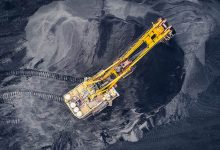Westpac has announced plans to offload its thermal coal investments over the coming decade, as the bank looks to align both its investments and its operations with a net zero emissions goal.
As part of an updated ‘climate change position statement for 2023‘ published on Monday, Westpac said that it would look to wind down its investments in the thermal coal sector, as well as setting a target of up to $3.5 billion in lending to climate-friendly investments over the next three years.
Westpac joins the Commonwealth Bank as the second of the ‘big four’ banks to plan their exit from the thermal coal sector, as financial institutions increasingly acknowledge that climate change represents an emerging financial risk.
Westpac said that it would still offer financing to metallurgical coal projects, but that it was “continuing to assess” whether investments in the oil and gas sector could continue in light of the bank’s commitments to a net zero emissions economy by 2050.
The bank has said that it has accepted that a transition to net zero emissions will be required by 2050, and will develop plans to align its portfolio with the goals of the Paris Agreement.
“The sooner we can reach net zero emissions, the more opportunity we have to meet the Paris Agreement’s long-term temperature goal. The path to net zero emissions needs to be well planned and occur in an orderly fashion to reduce transition risks,” the Westpac position statement says.
The bank says that under a scenario aligned with the Paris Agreement goals to reach net zero emissions by mid-century, Australia is expected to reach a market share for renewable electricity of around 90 per cent by 2050.
According to Westpac, this will be achieved through “investment in solar and wind, supported by grid-scale storage technologies”, while electricity demand continues to rise as sectors shift to greater electrification of energy use, including a shift towards electric vehicles.
The commitment to strengthen its climate change position comes despite Westpac recording a significant hit to its earnings in half-year results also published on Monday.
Westpac recorded a 62 per cent drop in net profit, driven by a $2.34 billion impairment charge that accounts for the impacts of both Covid-19 and the potential impact of an ongoing AUSTRAC legal proceeding.
In its latest climate position statement, Westpac highlighted that it viewed economic growth and emissions reductions as complementary goals and that investments in an early transition away from fossil fuels will lead to a stronger and more resilient economy over the medium and long term.
“While there is an upfront investment required to decarbonise the global economy, our research indicates that policies that incentivise and support early transition will lead to stronger economic growth and resilience over the medium and long term,” Westpac says in its climate position statement.
Westpac has also adopted emissions intensity targets for its electricity generation portfolio, setting an intensity target of 0.23 T.CO2-e per MWh by 2025, and reducing this further to 0.18 T.CO2-e per MWh by 2030.
The emissions intensity targets will effectively prevent the bank from investing in any new or existing coal fired power stations, as well as putting pressure on any investments in gas projects.
The announcement was welcomed by Market Forces, which as campaigned for Australia’s major banks to divest themselves of their fossil fuel holdings.
“Westpac’s policy is another nail in the coffin of the thermal coal industry and a stark warning to a federal government trying to leverage the COVID-19 pandemic to give the fossil fuel industry a leg up. This plan shows it won’t be happening with Westpac’s cooperation” Market Forces executive director Julien Vincent said.
“Last year, Commonwealth Bank was the first to commit to be out of thermal coal by 2030, along with all three of our general insurers. Now, anyone trying to operate a coal mine or power station in Australia by the end of this decade will need to do it without Westpac as well.”
Westpac has also committed to continue to reduce the companies own greenhouse emissions footprint. Last year Westpac joined the RE100 initiative, committing to purchase 100 per cent of its electricity consumption from renewable sources, including a signing a power purchase agreement with the Bomen solar farm constructed near Wagga Wagga.
Last week, major global bank HSBC published research showing that climate-friendly investment indexes have significantly outperformed the rest of the market since the start of 2020, showing that such investments were more resilience to economic shocks.
RenewEconomy and the Smart Energy Council will be co-hosting a “virtual conference” on May 6, focusing on a renewables-led economic recovery, featuring industry leaders, analysts and advocates. More information and registration here.
RenewEconomy and its sister sites One Step Off The Grid and The Driven will continue to publish throughout the Covid-19 crisis, posting good news about technology and project development, and holding government, regulators and business to account. But as the conference market evaporates, and some advertisers pull in their budgets, readers can help by making a voluntary donation here to help ensure we can continue to offer the service free of charge and to as wide an audience as possible. Thank you for your support.









